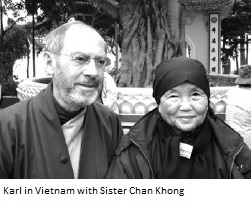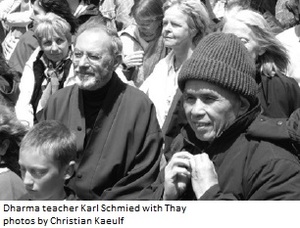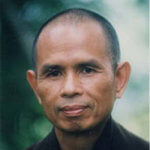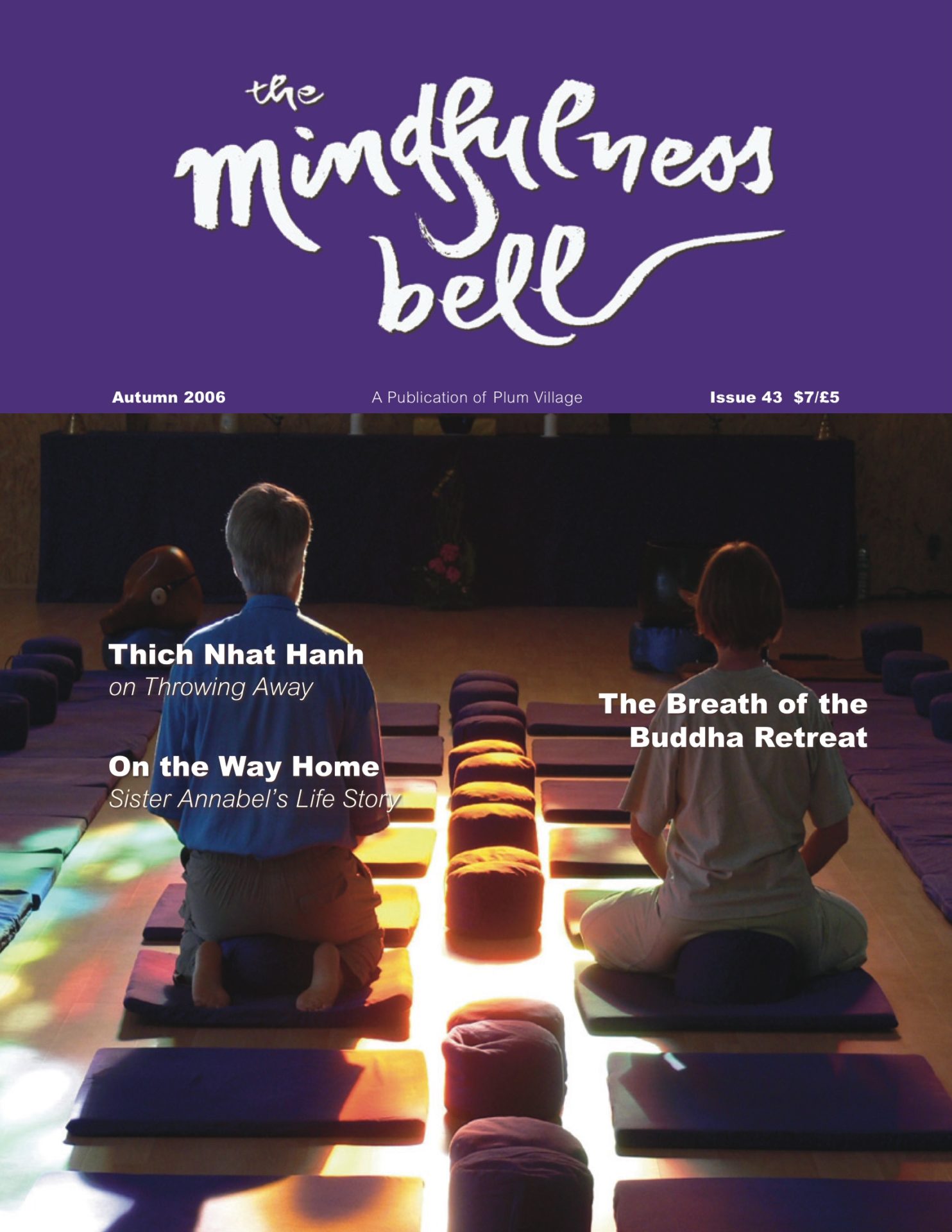By Thich Nhat Hanh in October 2006

On May 7, 2006, Brother Karl Schmied, True Dharma Eye, a senior OI member and Dharma teacher from Germany, passed away. Karl was a very active Sangha builder and also did a lot of work for the Hungry Children’s Program in Vietnam. Some of you may have met him recently when on tour with Thây inVietnam. With Karl and Helga Riedl,
By Thich Nhat Hanh in October 2006

On May 7, 2006, Brother Karl Schmied, True Dharma Eye, a senior OI member and Dharma teacher from Germany, passed away. Karl was a very active Sangha builder and also did a lot of work for the Hungry Children’s Program in Vietnam. Some of you may have met him recently when on tour with Thây inVietnam. With Karl and Helga Riedl, he started Intersein Zentrum (Haus Maitreya), a residential practice and retreat center in the tradition of Plum Village. He also founded “Intersein,” the German magazine for the Sangha. On Sunday, May 14th, after returning to Plum Village, Thây spoke quite a bit about Karl in what was a tribute to this OI member. Here is an excerpt from this Dharma talk (listen to the whole talk at www.deerparkmonastery.org).
Last week during the teaching tour in Holland and Belgium, I learned that Karl Schmied, a Dharma teacher of Plum Village, passed away in his home in Fischbachau, in southern Germany. We decided that a number of brother and sister monastics would go from Plum Village and take care of the funeral. In Plum Village we are very grateful to that delegation who went to Germany to take care of the funeral of Karl Schmied.
This is an excerpt from what Sister Bi Nghiem, a member of the delegation, wrote Thây:
“On Wednesday we brought some white flowers and came to Karl’s house around 9 a.m. He was lying in his meditation room in front of the altar surrounded by Buddha statues in the windows. Several big photos of Thây were around him, as well as candles, burning incense, and flowers. We put a photocopy of Thây’s fax, “no coming, no going,” directly beside him.

Usually the dead are dressed in formal wear—a black suit and white shirt. But Karl was dressed in his Order of Interbeing jacket with brown pants and a yellow turtleneck sweater, just like when he used to come to Plum Village. But his clothes were the only thing that were the way he used to be. Not only had Karl lost much weight but he had gone through a great transformation. His face showed a quality I hardly can describe. He showed a great inner freedom that comes from letting go. I felt a deep spiritual quality in him which I had never seen in him before, like a monk, is the only way I can describe it, like a real monk. I have seen dead people before but never anything like this. It was obviously the result of his life-long practice, of his trust in the Dharma, of his service to the poor in Vietnam. While I was sitting there, I felt it help me overcome my own fear of dying.”
Karl Schmied began his studies with Lama Govinda and he became a Dharma teacher in the Tibetan Buddhist tradition. He was a successful businessman and his first contact with Plum Village was in a retreat that Thây offered in Germany. Our publisher in Germany wanted him to come and see Thây but he refused. “I have seen many monks before and don’t need to see one more.” “But this monk is different, you should come to see him.” So he came to the retreat. That began a new chapter of his life. He began to practice according to the Plum Village teaching, became a Dharma teacher of Plum Village, a very happy Dharma teacher. He also went to Vietnam and taught, gave Dharma talks on mindfulness and how to practice. He helped the poor, the hungry children in Vietnam at a time when Thây and Sister Chan Khong could not go to Vietnam and do these things.
I remember one day after he had completed one retreat in Germany, he said good-bye and went to the south for a meeting for his business. I asked him whether he could release that meeting in order to come to our second retreat. He said, “That meeting is very important in my business.” So we went to the second retreat without him. The next morning at the sitting meditation session I looked down and saw him sitting. He told me afterward that while he was driving south at one point he was able to release that cow and make a u-turn and go back to the second retreat.
He had suffered from cancer for about eight years and this morning when I read Sister Bi Nghiem’s letter I saw that that cancer was a gift for him. Because with that cancer he started to practice more deeply, more wholeheartedly. That’s why he got the freedom that was expressed so clearly in Sister Bi Nghiem’s observation. About a month ago Sister Chan Khong and I went to Germany because we learned he was dying. We spent three days and three nights with him, and he was very happy during that time. We practiced together and he was able to accompany us to the airport when we went back to France.
When you know that you don’t have a lot of time to live, you know that you should use that time to practice deeply for your release, for your freedom. You don’t think of any other things. You don’t think of money, power, fame, or sex anymore. You are free. That is why Thây said that the cancer is a gift. You get freedom.
Sister Bi Nghiem wrote that while she was sitting there looking at his dead body she overcame her fear of dying. Because if you can die like that it is wonderful, you are free. Freedom is the greatest gift and freedom is the fruit of the practice. Without freedom you cannot die happily, you cannot live happily. And the way True Dharma Eyes, Karl’s Dharma name, the way he lived during the last few months before he died gave us a lot of confidence in the Dharma, in the practice. If you have the true practice usually you get the freedom that he got. There’s no doubt about it.
About 30 years ago a practitioner coming from the United Kingdom asked me, “Dear Thây, when do you think we are ready to be a teacher? When do you know you can be a good teacher?” And Thây said, when you are happy; because if you are not happy you cannot be a teacher. When you are happy, you are nourished by happiness and you nourish the people around you with happiness. This is real happiness. Many of us think of happiness in terms of power, fame, money, success, sex, because we have desire in us and happiness is the satisfaction of this desire. Many of us have been running after these objects of desire and we continue to suffer deeply by doing so.
In the teaching of the Buddha there is the expression “joy and happiness.” The practice should bring us joy and happiness. How to be joyful, how to be happy—the kind of joy and happiness that nourishes us and nourishes the world—that is the true question. In Plum Village we remind each other that life is available. With the true practice we can get in touch with the wonders of life in us and around us, so that we can be nourished, so that we can be healed, so that we can help nourish other people around us.
Thich Nhat Hanh
Lower Hamlet, May 14, 2006


